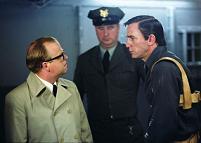 Is there room for two movies about Truman Capote? That’s the multimillion dollar question Hollywood is asking about “Infamous” (opening in limited release Friday), which tells the story of how the larger-than-life writer researched and wrote his groundbreaking nonfiction novel “In Cold Blood.” Yes, it’s the same story told in last year’s Oscar-winning “Capote.” And yes, there is room for two movies covering the same fertile territory.
Is there room for two movies about Truman Capote? That’s the multimillion dollar question Hollywood is asking about “Infamous” (opening in limited release Friday), which tells the story of how the larger-than-life writer researched and wrote his groundbreaking nonfiction novel “In Cold Blood.” Yes, it’s the same story told in last year’s Oscar-winning “Capote.” And yes, there is room for two movies covering the same fertile territory.
Despite the plethora of films about him, Truman Capote’s life is a challenging one to film. If most journalists want to blend into the background, soaking up facts and opinions and the essence of a story inconspicuously, Capote was all performance, forever the center of attention, especially his own. His story gives moviemakers a lot to work with–an outlandish personality is always fun to watch–but makes it difficult to scratch beneath the surface and get at the real human being underneath. If “Capote” masterfully recreated the life of performance that Capote lived, “Infamous” succeeds in breaking through that artifice, suggesting answers to some of the lingering questions left by the previous movie.
The new film doesn’t quite provide the answer to “Who was Truman Capote?” but it gives it a try, and the results are illuminating. We find out about his character-defining childhood trauma, and, through faux interviews, hear what the people closest to Capote thought of him. And “Infamous,” more so than “Capote,” portrays its subject in all his flamboyantly gay fabulousness. Standing a good head shorter than even many of his female friends, we see Capote both in his preferred element–gossiping with the high-society ladies with whom he loved to lunch, dance, and swap stories–and out of it, as he heads to small-town Kansas to report on the murder there of an upstanding farming family.
In the film, Capote is a man who seems to divide everyone he encounters into two groups: sources and subjects for his stories–and lucky listeners to those wonderful and witty tales. He is self-centered to the point of being entirely tone deaf to others’ needs and pain, whether they be the society ladies whose confidence he betrays regularly and remorselessly for the sake of spreading good gossip or the small-town sheriff into whose office Capote barges, demanding full access, insisting he’s a “writer,” not a “reporter,” and ranting about how he’s out to redefine the very definition of “reportage.”
It’s the two people in his life not from upper-class society–his boyfriend, Jack, and his childhood friend, Harper Lee, known as Nelle–who keep Capote grounded, to the extent that he’s ever grounded. But gradually, Capote’s obsession with the Kansas case strains his relationship with Jack, while Harper needs to return to her own life and career (“To Kill a Mockingbird” is coming out…), a fact Capote takes as a betrayal.
Into that void steps the most unlikely character, and that is Perry Smith, one of the confessed murderers. At first, Capote sweet-talks him for the same reason he does everyone else, to get his story. But as their conversations intensify, we see a new side of Capote, and realize he’s not acting this time: He’s falling in love with the subject of his book, a vicious murderer whose fate will either be life in prison or the gallows. Capote, of course, isn’t selfless enough in love to unambiguously root for Perry’s life to be spared; he understands that a death sentence will sell a lot more books, and is genuinely torn.
But Perry, like Jack and Nelle, manages to break through Capote’s perpetual performance and call him on his attitude toward others: “I’m not a character. I am a human being,” he tells Capote, defining exactly the central problem of Capote’s life, the reason that despite all the friends, despite the hob-nobbing with Hollywood glitterati, despite the air of fun and joy he constantly exuded, he was deeply lonely.
In Perry, Capote finds what he believes to be his true soul-mate; in his mind, they’re two wounded artists who rely on their art to cope with a troubled world: “Artists have the power to escape a degenerate world and create a better one,” he says. “Infamous” makes clear that one brush with reality–in the form of a convicted murderer with a sensitive exterior–is enough to ruin Capote, as he slides into a life of alcoholism following Perry’s hanging. And even in the end, Truman Capote remains unable to truly leave behind the artifice and performance that defines him, as he fabricates for his friends a story about Perry issuing a last-minute apology for his crimes.
It’s not hard to see why Truman Capote is suddenly on filmmakers’ minds. In a culture where “reality” is an idea bandied about lightly by TV networks and the White House alike, where we’re all about detached irony and the latest YouTube sensation, it’s instructive to take a look at a master of performance and reality-bending like Capote. Whether we see him as an example to be emulated or a warning to be heeded can say a lot about our own vantage point and values.


